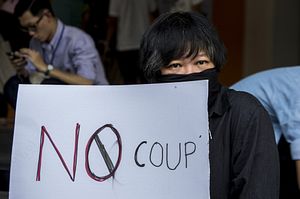Since the military coup in Thailand on May 22, the junta has adopted a zero-tolerance approach to dissent. Actual or would-be dissidents are subject to arbitrary arrest, incommunicado detention, and trial-by-military; print, radio and TV outlets have been warned not to interview academics with critical views; and internet service providers have been ordered to stop the spread of information that may cause “disorder” or negatively impact “stability.” In this scrupulously controlled and securitized environment, opposition to military rule has arisen in subtle, inventive and surreptitious forms.
Often gathering in small groups or as individuals, so as to circumvent the ban on political gatherings of more than five people, anti-coup activists have employed ostensibly mundane, prearranged acts to express their dissent. When practiced in solidarity, these peaceful acts of resistance – which have included wearing masks, reading books, eating sandwiches, and flashing three-fingered salutes as popularized in The Hunger Games franchise – transformed the banal into the subversive. Their flash-mob style also served to mitigate the risk of arrest. Practical, inclusive, and laced with humor, these acts embodied a spirit of non-violent mischief-making best articulated by prominent Thai activist Sombat Boonngamanong, who tweeted before his eventual arrest, “the people cannot use force, we can only annoy them.”
Such quotidian acts deftly blurred the boundary between dissent and permissible public expression, leaving authorities on the ground temporarily disoriented, unsure of their official collective response. To crack down – as it ultimately did – on such peaceful acts, the junta risked appearing farcically draconian. Although it attempted to head off any potential loss of prestige by deploying plainclothes police to arrest protestors (thereby absolving military men in uniform of performing the same indignity), the protests contributed to an indelible image-problem for the junta. This was summed up by a headline in the Global Post which read: “4 absurdly harmless acts now criminalized by Thailand’s military rulers.” While security forces find easy justification in the targeting of violent demonstrators, those bearing books and eating sandwiches are more difficult to demonize.
The silent reading protests which took place from late May, amid the shadows of the shopping malls that mark Bangkok’s consumer heartland, perhaps most evocatively conveyed activists’ anti-coup sentiment. Inspired by the silent reading protests that emerged in Istanbul in mid-2013, Thai activists gathered to read materials that were subtly provocative, with titles including The Power of Non-Violent Means, Waging Non-Violent Struggle, and Unarmed Insurrection, symbolizing both their opposition to military rule and their commitment to non-violent means. The act of reading in itself was a poignant statement against censorship; a symbolic reclaiming of intellectual freedom and a championing of contemplation over coercion and ideas over blinkered indignation. Whereas book-burning rituals signify the destruction of an idea, reading them casts a progressive eye to possible futures; illuminating not only what activists oppose but what they implicitly stand for.
This inclusive form of protest welcomed not only activists or the politically astute but, more broadly, readers. In the introduction to his A History of Reading, Alberto Manguel wrote that readers possess the means for “bringing back to life a message from the past, for creating secret spaces which no one else can enter while the reading takes place, for being able to redefine the universe and rebel against unfairness, all by means of a certain page.” The silent reading protests were a site at which bookishness and civil disobedience neatly intersected. The act of reading, like the other simple acts of resistance detailed above, was at once introspective yet defiant; personal yet political; sloganless, soundless and motionless yet pulsing with symbolism. While activists reading books such as George Orwell’s Nineteen Eighty-Four were engaged in a physically non-confrontational act, it waged confrontation on a higher plane: in a realm of ideas, where books, not incendiary projectiles, present a powerful and nuanced challenge to those with wealth and weapons.
Small acts of resistance against junta rule continue. On August 18, posters appeared around Thammasat University denouncing the coup and mocking the University’s rector Somkid Lertpaitoon for agreeing to join the junta’s National Legislative Assembly. Three days earlier, hundreds of anti-coup flyers were scattered along an area of Bangkok’s Ratchadamnoen Avenue. As the military cements its political position and unelected governance begins to feel like the norm, such small, localized and anonymous acts are no less important than overt and organized protest. As James C. Scott argues, “everyday forms of resistance” such as “petty acts of insubordination and evasion,” which are infinite and invariably unseen, nonetheless exert “a constant pressure, probing for weak points in the defenses of antagonists, and testing the limits of resistance.” The junta will be cognizant that dissent is only a signal or a sandwich away from materializing.
Dave Hopkins is a researcher based in Thailand.
































